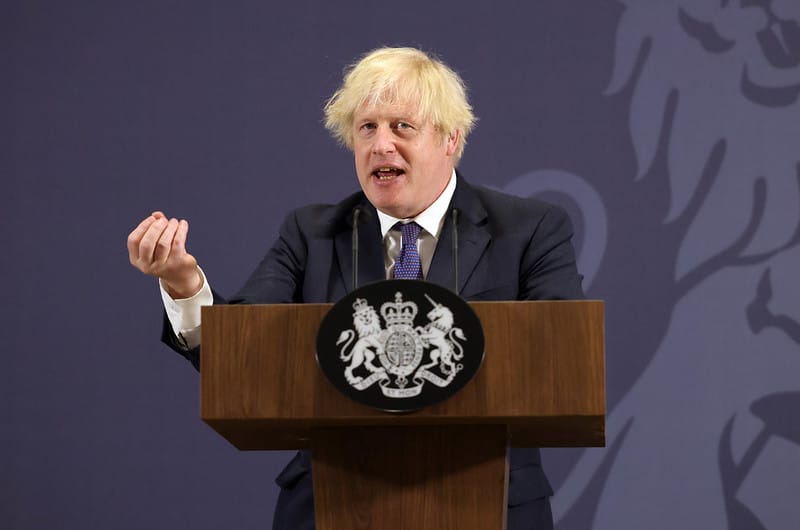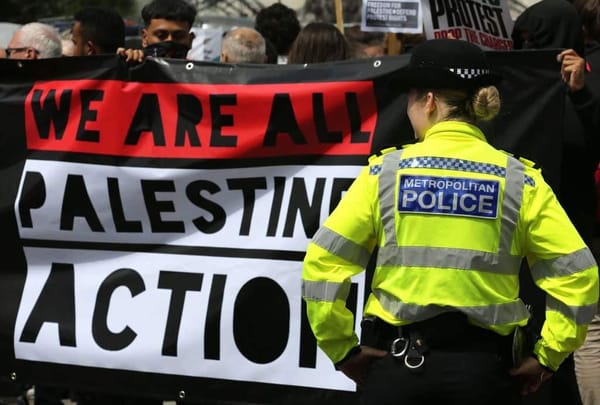Boris Johnson’s BDS ban must be opposed – not least by British Jews
The law would forbid even boycotts focused solely on the occupation, thereby framing opposition to the occupation as opposition to Israel as a whole.

Since the general election, Boris Johnson has moved quickly to cement the support of those who swept him to power. Though, for the most part, that has meant pushing through Brexit as quickly as possible, Johnson also seems determined to hold onto the votes he received from Britain’s Jewish community. It was therefore unsurprising to discover that last month’s Queen’s speech included a commitment to ban public institutions from participating in boycotts, divestment or sanctions (BDS) campaigns against foreign countries.
The announcement did not explicitly name Israel but it didn’t need to. Instead, the government cited antisemitism as justification for the new law and Jewish communal institutions heard the message loud and clear: the Board of Deputies, which had called for the measure in its pre-election manifesto, immediately put out a statement welcoming it, stating that BDS “intimidates Jewish communities in the Diaspora and does nothing to build peace in the Middle East.”
According to Jewish organisations on both the right and left, a majority of British Jews share the Board’s sentiments. A recent survey commissioned by the right-wing Campaign Against Antisemitism found that 76% of British Jews felt boycotts targeting Israel constituted intimidation. In 2015, the liberal Zionist organisation Yachad reported similar findings: according to their survey two-thirds of British Jews oppose sanctions against Israel—even if they thought such sanctions would encourage the Israeli government to engage in the peace process.
One of the most widely-used arguments used to substantiate the claim that BDS is antisemitic is its key demand that Palestinian refugees and their descendants be allowed to return to the places from which they were displaced during Israel’s establishment. Organisations such as the Anti-Defamation League, a US-based NGO that combats antisemitism worldwide, have suggested that this demand is antisemitic, since it would eliminate Israel’s Jewish majority and so effectively end its status as a Jewish state, thereby denying Jews’ right to self-determination. This is patently untrue: it is not antisemitic to support Palestinians’ demands to return to the homes they lost in the Nakba; nor to question the ethics of a constitution that privileges one group of citizens over another.
Others point to evidence of an overlap between people who hold antisemitic views, and those who support BDS, but this argument is also unconvincing. If BDS is inherently bigoted because some of its supporters are, then by the same logic, Zionism could be construed as antisemitic because some of those who support it; White Nationalists, for example, endorse aliyah as a form of voluntary ethnic cleansing.
Another commonly-cited reason for the BDS movement’s alleged antisemitism is that its proponents target Israel over other countries guilty of human rights abuses. This, they claim, can only be explained by antisemitism, whether conscious or otherwise. Antisemitism may indeed contribute to some people’s disproportionate focus on Israel—but so too does the fact that Israel-Palestine is one of the most important regions to the world’s two largest religions, not to mention a place in which major global powers (including Britain) have flexed their imperial muscles. The special interest many people have in Israel-Palestine is therefore wholly understandable.
The irony is that Johnson’s proposed law is more likely to hinder than help efforts to tackle antisemitism in the UK. There is little doubt that neither the prime minister nor his party really care about antisemitism. If they did, Johnson would not have let the five Conservative MPs who employed antisemitic tropes in the past year go unpunished. Boris Johnson is proposing this new law not because he genuinely wishes to protect the Jewish community but because he cynically wishes to shore up his support within it.
Jewish leaders continue to be fooled by this strategy. They calculate that Tory antisemitism is not a serious threat because of the party’s support for Israel, and so they have turned a blind eye to – even actively whitewashed – the former. Last year, the Board of Deputies retracted their criticism of Conservative MP Suella Braverman for her use of the far-right term “cultural Marxism”—and then apologised to her for insinuating that she might be antisemitic. A few months later, Home Secretary Priti Patel criticised “north London metropolitan elites” for their pro-immigration views and, instead of being rebuked by the Board of Deputies, was invited to give the toast at their annual dinner. This is eerily similar to what has been happening in the US, where organisations supposed to be leading the fight against antisemitism have muted their criticism of Trump because of his pro-Israel (or, more accurately, pro-occupation) policies, even as antisemitic hate crimes inspired by his rhetoric have skyrocketed.
Not only will this conflation of antisemitism and criticism of Israel allow antisemitism to flourish on the right, it will also make it much harder to discern and deal with antisemitism on the left. Left-wing Jews have spent much of the past few years persuading non-Jewish leftists that accusations of antisemitism are not simply made to stifle criticism of Israel. Yet our efforts are undermined when Jewish leaders celebrate the introduction of a law that, in the eyes of many, does just that.
Perhaps the biggest threat this law poses to tackling antisemitism is that it will limit Jews’ ability to build solidarity with other oppressed groups, historically the only effective way to fight racism. I do not believe that Jews should have to personally support BDS in order to be effective allies to Palestinians. Our relationships to Israel are often deep and complex, and we should never downplay how much of a leap it is for many Jews to actively engage in a boycott of the country. But at the very least, British Jews must acknowledge that BDS is a legitimate strategy of nonviolent resistance, and should understand that, just as supporting Israel from afar is a way for many Jews to stay connected to the country, so is BDS the only tangible action many Palestinians in the UK can take in support of their homeland. This is a classic example of the Conservatives pitting minorities against each other, sending the message that the interests of Jews and Palestinians are in conflict, rather than being intertwined, and making it harder for us to build the kind of alliances between our communities that we need.
The overriding irony of British Jewish communal support for this BDS bill is that it could well work against what most British Jews want for the region. British Jewry overwhelmingly supports a two-state solution, yet this bill will move us further from it. Over the past few years, including during Boris Johnson’s tenure as foreign secretary, the UK has remained consistent with the EU in supporting a two-state solution, and has therefore opposed Israeli efforts to undermine one by expanding settlements and demolishing Palestinian villages. Yet Johnson’s new law brings us more in line with Trump’s US foreign policy, which aggressively supports Israel’s attempts to bring about a one-state solution (as the UK’s growing insignificance on the world stage is catalysed by Brexit, it is easy to imagine the British embassy being moved to Jerusalem as leverage for a trade deal with the US or Israel). The law would forbid even boycotts focused solely on the occupation, thereby framing opposition to the occupation as opposition to Israel as a whole. This is entirely consistent with the Israeli government’s strategy of blurring the Green Line so as to render the occupation an integral part of the Israeli state, a conflation British Jews should—and, in many cases, do—resist.
This proposed law poses a test for the Jewish community. It challenges us to prove that we are serious when we talk about peace in Israel-Palestine. It asks us to demonstrate that criticism of Israel is not inherently antisemitic. Most importantly, it requires us to show that we are serious about solidarity and willing to extend it to Palestinians. After a period of intense concern about antisemitism, legislation which appears to protect us will be tempting to many in the Jewish community—but we must see it for what it is, a cynical attempt by a government with no real concern for racism to undermine solidarity and pave the way for foreign policy which has even less regard for human rights. If our community really cares about discrimination, in the UK or in Israel-Palestine, the law must be unreservedly opposed. ▼
Tommer Spence is a PhD student at Warwick Medical School and one of the founding members of Na’amod: British Jews Against Occupation. He tweets.




